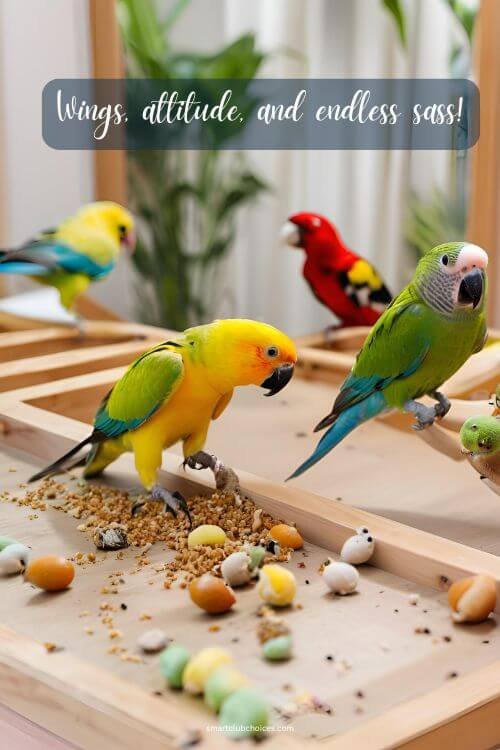Birds: A Guide to Bird Diet and Nutrition
Let’s talk about bird food. No, not the stale crumbs you toss to pigeons at the park—we’re talking about the gourmet, nutrient-packed meals your feathered friend deserves. Because let’s face it, a healthy bird is a happy bird, and a happy bird is a joy to have around.
But with so many options out there—seeds, pellets, fruits, veggies—it’s easy to feel overwhelmed. Don’t worry, we’ve got your back. In this guide, we’ll break down everything you need to know about bird diet and nutrition. From seeds to supplements, we’ve got you covered. Let’s dive in!
Table of Contents
(1) The Basics – Understanding Bird Nutrition
Why Diet Matters
A balanced diet is the foundation of your bird’s health. It affects everything from their feathers to their energy levels to their lifespan.
What Do Birds Need?
- Proteins: For muscle development and repair.
- Carbohydrates: For energy.
- Fats: For healthy skin and feathers.
- Vitamins and Minerals: For overall health and immunity.
Pro Tip
Different species have different dietary needs, so always research your specific bird.
(2) Seeds – The Classic Choice
Why Seeds Are Popular
Seeds are like the fast food of the bird world—easy, convenient, and loved by birds. But not all seeds are created equal.
The Good, the Bad, and the Fatty
- Good Seeds: Millet, canary seed, and safflower seeds are nutritious options.
- Bad Seeds: Sunflower seeds and peanuts are high in fat and should be given in moderation.
Pro Tip
Seeds should only make up about 10-20% of your bird’s diet. The rest should come from pellets, fruits, and veggies.
(3) Pellets – The Balanced Option
Why Pellets Are Great
Pellets are like the superfood smoothies of the bird world. They’re packed with all the nutrients your bird needs in one convenient package.
Choosing the Right Pellets
- High-Quality: Look for pellets made from natural ingredients with no artificial colors or preservatives.
- Species-Specific: Some pellets are formulated for specific species, so choose accordingly.
Pro Tip
Transition your bird to pellets gradually by mixing them with their current food and increasing the ratio over time.
(4) Fruits and Veggies – The Fresh Stuff
Why Fresh Foods Are Important
Fruits and veggies are like the vitamins and minerals of the bird world. They provide essential nutrients and add variety to your bird’s diet.
Bird-Safe Options
- Fruits: Apples, bananas, berries, and melons (remove seeds and pits).
- Veggies: Carrots, broccoli, spinach, and bell peppers.
Pro Tip
Wash all fruits and veggies thoroughly to remove pesticides, and cut them into small, manageable pieces.
(5) Supplements and Treats – The Extras
Why Supplements Can Help
Even with a balanced diet, some birds may need extra nutrients. Supplements can fill in the gaps.
Common Supplements
- Calcium: For strong bones and eggshell formation.
- Vitamins: For overall health and immunity.
- Probiotics: For digestive health.
Treats
- Healthy Options: Small pieces of fruit, nuts, or whole grain bread.
- Moderation: Treats should make up no more than 5% of your bird’s diet.
Pro Tip
Use treats as a reward during training or to encourage picky eaters to try new foods.

(6) Conclusion: A Healthy Bird is a Happy Bird
Feeding your bird might seem complicated, but it’s worth it to see your feathered friend thrive. With a balanced diet of seeds, pellets, fruits, and veggies, you can ensure your bird gets all the nutrients they need to live a long, healthy life.
Remember, every bird is different, so take the time to understand your bird’s unique needs and preferences. And don’t forget to enjoy the journey—watching your bird enjoy their food is one of the most rewarding experiences a bird parent can have. So, go ahead and spoil your bird (within reason, of course). After all, a healthy bird is a happy bird, and a happy bird makes for a very happy human.








